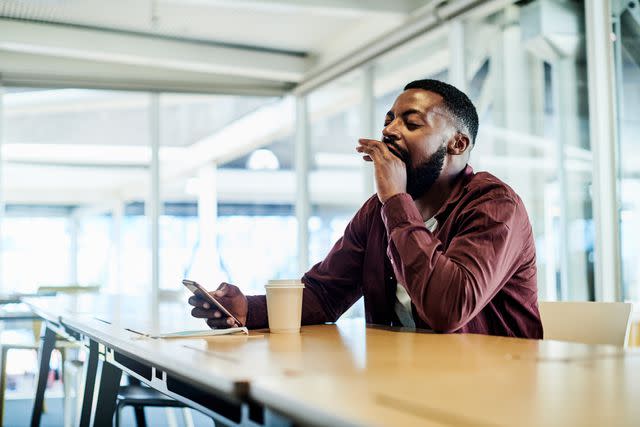Why Coffee Can Have the Opposite Effect and Make You Sleepy
Medically reviewed by Melissa Nieves, LND
People drink coffee for its ability to increase alertness. However, for some people, coffee makes them more tired. This is likely due to caffeine blocking the receptors of a chemical found in human cells called adenosine. It may also be due to poor sleep habits or the development of caffeine tolerance.
This article will discuss why caffeine can make some people sleepy and what to do to optimize the effects of caffeine.

jeffbergen / Getty Images
Reasons Coffee Makes Some People Sleepy
Coffee is a popular morning beverage. Around 85% of the U.S. population drinks at least one caffeinated beverage daily.
For many people, this daily dose of caffeine helps them wake up and stay alert, but for others, it can make them more tired. Below are the reasons why caffeine may make some people sleepy.
Disrupts Nighttime Sleep
Many people drink coffee to wake up and stay awake during the day. Then, when they go to bed, they have difficulty falling asleep. This creates a vicious cycle, in which a lack of sleep encourages someone to drink coffee, then makes it difficult for them to sleep.
One-third of Americans typically sleep less than the recommended minimum of seven hours per night. And research shows that caffeine consumption is linked to insomnia. Studies have shown that consuming caffeine even six hours before bedtime can disrupt nighttime sleep.
Adenosine Blocker
Adenosine is a crucial part of the sleep/wake cycle. It increases the time that someone is awake and decreases the time that they are asleep.
How coffee makes someone sleepy is that the caffeine in coffee blocks adenosine receptors in the brain, which prevents adenosine from causing sleepiness. Over time, the body increases its sensitivity to adenosine, and once caffeine is metabolized, it can cause excessive tiredness.
The time it takes caffeine to be metabolized (processed and used) varies from person to person. About 99% of caffeine is absorbed within 45 minutes of consumption. It peaks at one to two hours, and its half-life (the time it takes the concentration of a substance to decrease by 50% in the body) is 2.5 to five hours.
Caffeine Tolerance
People who drink coffee or other caffeinated products regularly can develop a tolerance to caffeine. This means that they become used to the effects of caffeine and may need more to achieve their desired effects.
Taking in more caffeine to achieve the desired effects can negatively impact sleep. Ultimately, this leads to tiredness despite drinking coffee.
Learn More: Understanding Caffeine Sensitivity
Blood Sugar Effects
A morning coffee may contribute to insulin resistance (when cells don’t respond well to insulin and can’t take up glucose from the blood, causing the pancreas to produce more insulin).
A 2020 study found that drinking coffee in the morning after a poor night's sleep increased glucose intolerance, causing higher than average blood glucose levels. Interestingly, the study also found that a poor night's sleep without a morning coffee did not reduce glucose tolerance.
The caffeine causes a rise in glucose levels, which will then fall back down. When these glucose levels return to normal, a person may feel tired and have lower energy levels.
Conditions Associated With Fatigue
There are many causes of fatigue. It can be a normal side effect of physical exertion or lack of sleep. It can also be caused by several different health conditions, including:
Anemia (lack of healthy red blood cells)
Depression
Cancer
Heart failure
Diabetes
Addison's disease (adrenal glands do not produce enough hormones)
Sleepy After Coffee But Not Other Caffeinated Drinks
Caffeine and how it affects the body is the underlying reason behind why someone would feel sleepy after drinking coffee.
Other caffeinated drinks—with similar caffeine content—should have the same effects as coffee. However, many caffeinated energy drinks have higher caffeine content than coffee, which may be why someone who is used to the caffeine content of coffee does not feel tired after drinking an energy drink.
An example is energy drinks range from 40 milligrams (mg) to 250 mg. Whereas a cup of coffee is approximately 80 mg to 100 mg.
What Can You Do to Feel Awake After Coffee?
Coffee can be a good way to increase morning alertness but cannot cover up long-term poor sleep habits.
Two of the best ways to feel awake after coffee is to make sure you are getting enough sleep and do not drink coffee within six hours of bedtime.
Summary
Coffee contains a popular stimulant called caffeine that can help some people perk up in the morning. But for others, coffee can make them feel more tired. This may be due to how the caffeine in coffee blocks the chemical receptors for adenosine. It may also be due to caffeine tolerance and poor nighttime sleep.
Read the original article on Verywell Health.

